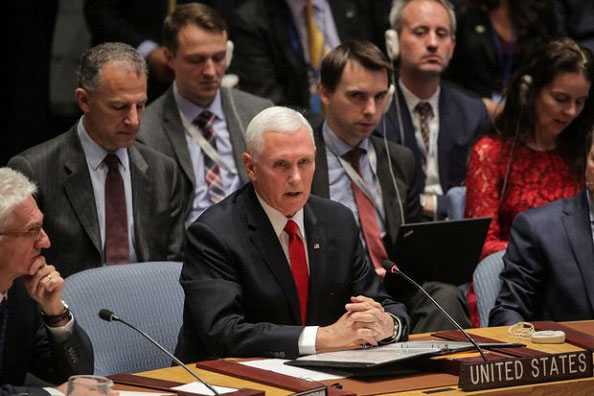UNITED NATIONS, (Reuters) – U.S. Vice President Mike Pence called on the United Nations yesterday to revoke the U.N. credentials of Venezuelan President Nicolas Maduro’s government and recognize opposition leader Juan Guaido as the country’s legitimate leader.
He said the United States had drafted a U.N. resolution and called on all states to support it.
“The time has come for the United Nations to recognize interim president Juan Guaido as the legitimate president of Venezuela and seat his representative in this body,” Pence told the U.N. Security Council.
Diplomats said it is unlikely Washing-ton will get the support needed to adopt such a measure in the 193-member U.N. General Assembly. The United States and Russia both failed in rival bids to get the 15-member Security Council to adopt resolutions on Venezuela in February.
More than 50 countries have recognized Guaido as Venezuela’s leader. When asked if the United States thought it had enough backing to oust Maduro’s government at the United Nations, Pence said: “I think the momentum is on the side of freedom.”
Russian U.N. Ambassador Vassily Nebenzia accused the United States of provoking an artificial crisis to oust Maduro and replace him “with their own pawn,” actions he described as a “lawless, thuggish violation of international law.”
“We call on the United States to once again recognize that the Venezuelan people and other peoples have the right to determine their own future,” Nebenzia said. “If you want to make America great again, and we are all sincerely interested in seeing that, stop interfering in the affairs of other states.”
The U.N. has previously had to address competing claims from other countries for representation at the world body.
Venezuelan U.N. Ambassador Samuel Moncada said he had been expecting such a move from the United States and Venezuela had been campaigning for months to ensure support for Maduro.
“I sound a warning bell … there is a clear move here again to undermine our rights and if they can undermine our rights, they can undermine the rights of all members of this organization,” he told the Security Council.
The United States called Wednesday’s meeting of the Security Council to discuss the humanitarian situation in Venezuela. U.N. aid chief Mark Lowcock told the council that there is a “very real humanitarian problem” in the country.
“The scale of need is significant and growing,” Lowcock said. “We can do more to relieve the suffering of the people of Venezuela, if we get more help and support from all stakeholders.”
He briefed the council on a recent U.N. report on the situation that estimates about a quarter of Venezuelans are in need of humanitarian assistance, and painted a dire picture of millions of people lacking food and basic services.
Some 3.4 million Venezuelans have left the country and the United Nations predicts that will rise to some 5 million by the end of the year.
Maduro, who has denied that Venezuela was experiencing a humanitarian crisis, said in an address on state television on Wednesday that the country had reached “an agreement” with the International Red Cross to work with the United Nations to bring in aid.
He said Foreign Minister Jorge Arreaza was “negotiating a formal document” on the aid with the Red Cross.
Maduro blames U.S. sanctions for the country’s economic problems, but has accepted aid from ally Russia. In February, Venezuelan troops blocked U.S.-backed aid convoys trying to enter from Colombia and Brazil.

